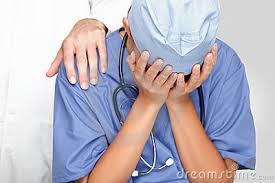2nd Victims of Medical Errors and the Disclosure Movement
 Recently I had dinner with a CMO for a major medical system, and the CMO said it really upsets him when a defense lawyer tells a doc "not to worry about an adverse event or a lawsuit....it will go away...that's what insurance and lawyers are for." The CMO said there is absolutely no consideration for the feelings of the doc (or nurse)...no thought about the emotional trauma visited upon the clinician or his/her family. Adverse events are reduced to monetary fights between lawyers.
For 10+years at Sorry Works we have worked to "re-humanize" discussions concerning adverse events....we have continually said that when clinicians/hospitals apologize to patients and families for medical errors, the anger is often removed, and the post-event discussions evolve from an angry fight over money to a more robust and fair discussion of how the financial and emotional needs of the patient/family can be met in an expedited manner, saving everyone time, money, and stress.
Recently I had dinner with a CMO for a major medical system, and the CMO said it really upsets him when a defense lawyer tells a doc "not to worry about an adverse event or a lawsuit....it will go away...that's what insurance and lawyers are for." The CMO said there is absolutely no consideration for the feelings of the doc (or nurse)...no thought about the emotional trauma visited upon the clinician or his/her family. Adverse events are reduced to monetary fights between lawyers.
For 10+years at Sorry Works we have worked to "re-humanize" discussions concerning adverse events....we have continually said that when clinicians/hospitals apologize to patients and families for medical errors, the anger is often removed, and the post-event discussions evolve from an angry fight over money to a more robust and fair discussion of how the financial and emotional needs of the patient/family can be met in an expedited manner, saving everyone time, money, and stress.
Now it is time we worry about meeting the emotional needs of the clinicians involved in adverse events. During a recent trip to California two friendly physicians said until we learn to take better care of clinicians post-event, disclosure will never fully take root. As one doc said to me, it starts with NOT yelling at clinicians post-event and NOT suspending or firing them, and then, as another doc said, giving the doc or nurse and their families the emotional support they need OR it may be impossible for them to say "sorry" to the patient or family.
Personally, I've heard one too many stories of clinicians quitting or retiring early, suffering family problems including divorce, and even committing suicide all because they are not given adequate emotional support post-event. Telling a doc or nurse "the lawyers will take care of it" does NOTHING to address the PTSD they are suffering.
There is a very robust disclosure movement in the United States, and a smaller but growing 2nd victim support movement. Unfortunately, there is not enough overlap between the two -- but the two concepts need to be married together. We need to support everyone post-event. Not only do we to talk better to patients and families post-event and treat them in a more humane fashion, the same goes for docs and nurses. I dedicate an entire chapter in my new "Sorry Works! Tool Kit Book" to this topic (more on the new book next week).
Also, the Center for Patient Safety, based in Missouri, is hosting a 2nd Victim Training Workshop on September 24, 2015 in St. Louis, MO. Sue Scott and Laura Hirschinger of the University of Missouri's well-known 2nd Victim Support program will lead this training seminar. If you want to learn about 2nd victim support, you need to attend this training seminar. To learn more about this valuable seminar and register, visit this link.

